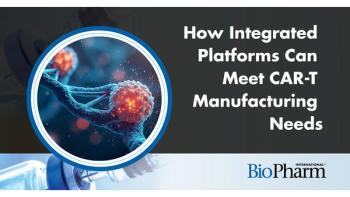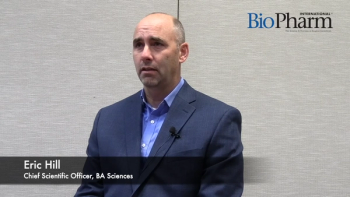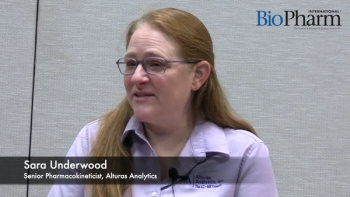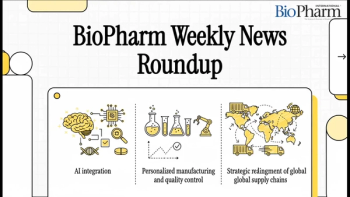
AI, biomarkers, and novel oncology modalities are driving evolution in biopharma pipelines, according to Nmblr CEO Janice MacLennan.

AI, biomarkers, and novel oncology modalities are driving evolution in biopharma pipelines, according to Nmblr CEO Janice MacLennan.

Janice MacLennan, CEO of Nmblr, notes how AI is transforming biopharma R&D and market access, forcing teams to prove value beyond science and redesign work around human strengths.

In part two of an interview, Daniel Delubac, iOrganBio CEO, explains how digitized, in-vitro human biology models aim to improve preclinical drug testing.

AI-driven human cell models aim to replace animal testing and deliver more accurate, data-driven insights, says iOrganBio CEO Daniel Delubac ahead of the J.P. Morgan Healthcare Conference.

In Episode 31, industry veteran Deborah Dunsire goes behind the headlines to discuss the current state of innovation and evolving drug development landscape.

Digitalization is expected to reshape bioprocessing, supply chains, and quality systems for biopharma developers amid tariffs, geopolitics, and shifting capital flows, according to BioPlan Associates’ Eric Langer.

In the biopharma industry during 2025, quality, tariffs, MFN pricing, and strategic outsourcing deals drove innovation and investment.

Autolomous and Trenchant’s partnership, begun early in 2025, addresses unmet CGT manufacturing needs, including slashing costs and cutting timelines.

In this episode of the Ask the Expert video series, Susan J. Schniepp, Regulatory Compliance Associates (RCA), and Siegfried Schmitt, Parexel, tackle the ever-growing problem of having a properly trained workforce with a variety of needed skill sets.

Chris Spivey explains how billions wasted on flawed near-infrared glucose sensing could have been avoided.

In Episode 29, John Androsavich, Benjamin Fryer and John Wilkerson go behind the top headlines from 2025.

The discussion in this Drug Digest video focuses on optimizing biopharmaceutical manufacturing and supply chain efficiency through the mastering of AI capabilities, data integration, and critical validation challenges.

ADC oncology platforms, FDA CNPV rapid review, and significant investment into US biologics manufacturing capacity led this week’s news.

News in the week shows biopharma development being redefined by programmable biology and accelerated FDA review, stressing quality compliance and market efficiency.

In this episode of the Ask the Expert video series, Susan J. Schniepp, Regulatory Compliance Associates (RCA), Siegfried Schmitt, Parexel, and Anita Michaels, RCA, explain how CDMOs can best handle regulatory inspections and client expectations.

Eric Hill, Chief Scientific Officer, BA Sciences, discusses the how E&L testing principles can be adapted to biologic products and the unique challenges biologic drugs face regarding E&Ls.

Government and academic leaders say that to prevent catastrophic loss of expertise and investment, coordinated policy and significant investment in workforce talent are urgently needed in the UK.

This week’s biopharma news highlights formulation stability testing, automation in analytics, and achieving regulatory compliance.

Eric Hill, Chief Scientific Officer, BA Sciences, discusses the analytical challenges involved in conducting E&L testing for biologic drug products.

Reliable bioanalysis and regulatory-compliant study design enhance drug development, says Alturas’s Sara Underwood at AAPS PharmSci 360.

Novel biologics, from ADCs to in-vivo cell therapy, drive AI-enhanced quality control and supply chain flexibility in global biopharma innovation.

AI, gene therapy, top research breakthroughs, and more will be highlighted at this year’s AAPS PharmSci 360, according to programming chair, Mei He.

Digital transformation, data integrity protocols, and regionalized supply chains are crucial strategies for optimizing drug development and manufacturing efficiency, as revealed in our exclusive interviews.

Shilpa Biologicals CEO Sridevi Khambhampaty addresses funding pressures, regional supply strategies, and expanding ADC development.

AI and innovative technology platforms are revolutionizing biopharma R&D and manufacturing, but success requires high data quality and next-gen solutions.

In the conclusion of a two-part conversation, Viktoria Enkmann of RNAnalytics says she had a hard time understanding the United States’ mRNA decision in August 2025.

Digital platforms, automation, and new tech are driving efficiency, innovation, and advanced skill building in biomanufacturing, according to Sigma Mostafa of KBI Biopharma.

In the first of two parts, Viktoria Enkmann addresses problems with quality control for personalized medicines in the context of lipid nanoparticles and RNA therapeutics overall.

Enzyme engineering holds promise, but Marina Cañellas of Zymvol Biomodeling says the enzymes themselves need to be improved through increased discovery and investigation to be able to achieve a greater amount of chemical reactions.

Vishal Mukund Sonje, Vaccine Manufacturing Lead, CEPI, talks about the challenges that arise in the manufacturing of vaccines in various global regions and gives a preview of his presentation at CPHI Frankfurt 2025.